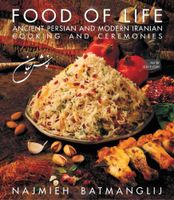Advertisement
Pomegranate
Anar
Appears in
Published 2011
The red pomegranate, native to Iran and cultivated there for at least 4,000 years, is considered the fruit of heaven; in fact, it was probably the real “apple” in the Garden of Eden. The ancients commended it. Among them were King Solomon, who had a pomegranate orchard. And
The fruit grows on large bushes or small trees, whose masses of crimson flowers brighten the pale mud walls of villages in Iran, Spain, and Italy. In Persian folk medicine, every part of the plant is believed to have virtue. The dried and powdered skin of the roots and fruit make a tea drunk to sweeten the breath, correct menstrual irregularity, kill parasites, and relieve nausea. Another tea, made from young shoots and leaves, fresh or dried, is a good remedy for nausea, lack of appetite, anemia, and headaches. The flowers repel insect pests—even honeybees avoid them—and provide yet a third tea, good for soothing uneasy stomachs.


